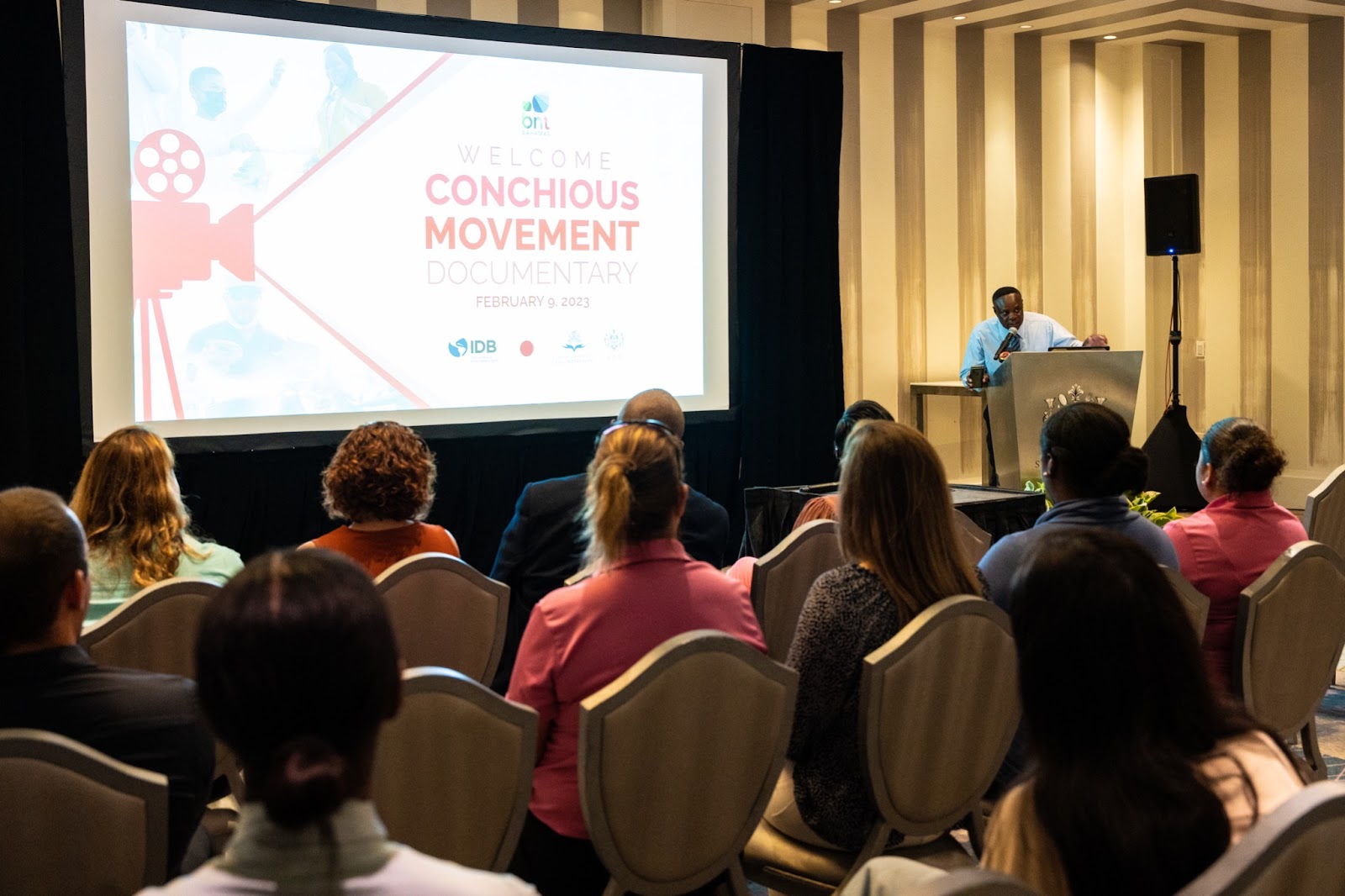BNT Highlights Ongoing Work to Save Conch During “Conchious Movement” Event

Febraury 24th, 2023 – Nassau, Bahamas
The Queen Conch is a species that plays an integral role in Bahamian culture and supports the livelihoods of many Bahamians as a highly in-demand product in the fishing industry. But this high demand for conch, both locally and abroad, has led to overfishing, poaching, and a decline in conch populations around The Bahamas. If things continue at this rate, soon there will be no more conch.
This is the message of The Bahamas National Trust’s (BNT) “Conchious Movement” documentary, which not only highlights the plight of Queen Conch, but shows the start of a solution.
The short educational film follows fishers of McClean’s Town and Sweeting’s Cay in East Grand Bahama as they engage in surveys, workshops, trainings, and an exchange trip to learn sustainable fishing practices for conch and ways to make better use of the species as a resource. This effort, known as the Community-based Conch Management Project or “IDB Conch,” was financed by the Japan Special Fund for Poverty Reduction through the Inter-American Development Bank.
“Conchious Movement” was produced by Lavardo Stubbs and his company “Conch Boy Films,” along with BNT Science Officer Jewel Thompson-Beneby. It recently had its New Providence premier at the SLS Baha Mar after first premiering in Grand Bahama in 2022. For this event, several of the fishers who participated in the project traveled to New Providence to join the BNT and its partners as the message of “Conchious Movement” was broadcast for the first time outside of Grand Bahama. These fishers shared their experiences under the project and gratitude for the end results.
During the premier, Falon Cartwright, BNT Director of Science & Policy, also announced a new project the BNT is taking on to advance “conchservation.” She said: “As we continue to grapple with the sobering reality that conch is still at risk of extinction within our lifetime, there is value in exploring innovative ways to save this iconic species.
“We intend to explore the potential for conch farming or ‘aquaculture’ – not for commercial purposes but for restoration – to help conch populations rebound and support species recovery. Currently, one of our projects is the development of a mobile hatchery – the first in the world – at the Moriah Harbour Cay National Park (MHCNP) in Exuma, to cultivate conch at the egg and larval phases.”
The goal of the project, according to Cartwright, is to better understand how national parks can be used not only to protect but also restore conch populations. “Ultimately, we want to determine if this model is scalable, and if it can be replicated and expanded throughout the park system, the country, and even the region.”
Nothing quite epitomizes Bahamian culture like the Queen Conch; but this beloved species needs urgent intervention to preserve it for Bahamians for now and tomorrow.
BNT Executive Director Lakeshia Anderson-Rolle said: “It’s hard to sufficiently describe the importance and value of the Queen Conch to The Bahamas. The Queen Conch is ingrained in our culture; it is a staple in our diet; and it sustains the livelihoods of thousands of Bahamians – all around the country. Conch also plays a vital role in the marine ecosystem as a grazer and food source for other species. Despite all these benefits, our beloved conch is still a species in peril.
“National parks are a key conservation tool in the race to conserve conch,” she added. “Marine parks protect expansive areas of healthy conch habitat and, in some cases, thriving populations. The Exuma Cays Land and Sea Park (ECLSP) – the world’s first land and sea park – protects populations of mature conch that can reproduce and replenish areas outside of the park’s boundaries. However, a single marine reserve such as the ECLSP, in isolation, cannot indefinitely conserve a species subject to heavy fishing in the surrounding waters. We need a robust network of interconnected marine protected areas. This is why the BNT and its partners are focusing on enhancing the Bahamas National Protected Area System to improve the management and effectiveness of these priority sites.”
Anderson-Rolle emphasized the need for conch conservation to remain a priority for The Bahamas.
“More outreach and education, well-enforced fishery regulations, and community involvement is required for the sustainable harvest of Queen Conch well into the future.
“The BNT is committed to continuing to advance efforts that will create a more sustainable conch fishery; and to developing and improving our national park system to support healthy conch populations through collaborative approaches with stakeholders.”
To learn more about the role the BNT plays to manage terrestrial and marine national parks, protect species that inhabit them, and inform environmental policy, please visit its website: www.bnt.bs and follow/subscribe to various social media channels: Facebook, Instagram, Twitter, and YouTube.
###
Media Contact: Leah Carr | lcarr@bnt.bs | (242) 429-7902
About the BNT:
The Bahamas National Trust (BNT) was created by an Act of Parliament in 1959 to build and manage the national park system of The Bahamas. Possibly the only non-governmental organization in the world charged with such a responsibility, the BNT works daily to conserve and protect the natural resources of The Bahamas through stewardship and education for present and future generations. There are currently 32 National Parks managed by the BNT with more than 2 million acres of marine and terrestrial areas protected.